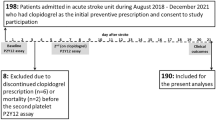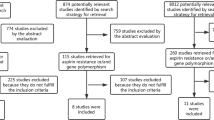Abstract
Aspirin prevents the production of thromboxane A2 (TXA2) by irreversibly inhibiting platelet cyclooxygenase, exhibiting antiplatelet actions. This agent has been reported to prevent relapse in patients with ischemic heart disease or cerebral infarction via this action mechanism. However, there are individual differences in this action, and aspirin is not effective in some patients, which is referred to as ‘aspirin resistance’. In this study, we analyzed laboratory aspirin resistance by platelet aggregation in 110 healthy adult Japanese males using 24 single-nucleotide polymorphisms (SNPs) of nine genes involved in platelet aggregation/hemorrhage. Among SNPs involved in platelet aggregation, aspirin was less effective for 924T homozygote of a TXA2 receptor, 924T>C, and 1018C homozygote of a platelet membrane glycoprotein GPIbα, 1018C>T, suggesting that 924T and 1018C alleles are involved in aspirin resistance.
This is a preview of subscription content, access via your institution
Access options
Subscribe to this journal
Receive 6 print issues and online access
$259.00 per year
only $43.17 per issue
Buy this article
- Purchase on Springer Link
- Instant access to full article PDF
Prices may be subject to local taxes which are calculated during checkout





Similar content being viewed by others
References
Craven LL . Experiences with aspirin (Acetylsalicylic acid) in the nonspecific prophylaxis of coronary thrombosis. Miss Valley Med J 1953; 75: 38–44.
Weiss HJ, Aledort LM . Impaired platelet/connective-tissue reaction in man after aspirin ingestion. Lancet 1967; 2: 495–497.
Smith JB, Willis AL . Aspirin selectively inhibits prostaglandin production in human platelets. Nat New Biol 1971; 231: 235–237.
Vane JR . Inhibition of prostaglandin synthesis as a mechanism of action for aspirin-like drugs. Nat New Biol 1971; 231: 232–235.
Funk CD, Funk LB, Kennedy ME, Pong AS, Fitzgerald GA . Human platelet/erythroleukemia cell prostaglandin G/H synthase: cDNA cloning, expression, and gene chromosomal assignment. FASEB J 1991; 5: 2304–2312.
Antithrombotic Trialists' Collaboration. Collaborative meta-analysis of randomised trials of antiplatelet therapy for prevention of death, myocardial infarction, and stroke in high risk patients. BMJ 2002; 324: 71–86.
Eikelboom JW, Hirsh J, Weitz JI, Johnston M, Yi Q, Yusuf S . Aspirin-resistant thromboxane biosynthesis and the risk of myocardial infarction, stroke, or cardiovascular death in patients at high risk for cardiovascular events. Circulation 2002; 105: 1650–1655.
Gum PA, Kottke-Marchant K, Welsh PA, White J, Topol EJ . A prospective, blinded determination of the natural history of aspirin resistance among stable patients with cardiovascular disease. J Am Coll Cardiol 2003; 41: 961–965.
Quinn MJ, Topol EJ . Common variations in platelet glycoproteins: pharmacogenomic implications. Pharmacogenomics 2001; 2: 341–352.
Pontiggia L, Lassila R, Pederiva S, Schmid HR, Burger M, Beer JH . Increased platelet-collagen interaction associated with double homozygosity for receptor polymorphisms of platelet GPIa and GPIIIa. Arterioscler Thromb Vasc Biol 2002; 22: 2093–2098.
Afshar-Kharghan V, Li CQ, Khoshnevis-Asl M, Lopez JA . Kozak sequence polymorphism of the glycoprotein (GP) Ib alpha gene is a major determinant of the plasma membrane levels of the platelet GP Ib-IX-V complex. Blood 1999; 94: 186–191.
Undas A, Brummel K, Musial J, Mann KG, Szczeklik A . Pl(A2) polymorphism of beta(3) integrins is associated with enhanced thrombin generation and impaired antithrombotic action of aspirin at the site of microvascular injury. Circulation 2001; 104: 2666–2672.
Szczeklik A, Undas A, Sanak M, Frolow M, Wegrzyn W . Relationship between bleeding time, aspirin and the PlA1/A2 polymorphism of platelet glycoprotein IIIa. Br J Haematol 2000; 110: 965–967.
Best D, Senis YA, Jarvis GE, Eagleton HJ, Roberts DJ, Saito T et al. GPVI levels in platelets: relationship to platelet function at high shear. Blood 2003; 102: 2811–2818.
Halushka MK, Walker LP, Halushka PV . Genetic variation in cyclooxygenase 1: effects on response to aspirin. Clin Pharmacol Ther 2003; 73: 122–130.
Papafili A, Hill MR, Brull DJ, McAnulty RJ, Marshall RP, Humphries SE et al. Common promoter variant in cyclooxygenase-2 represses gene expression: evidence of role in acute-phase inflammatory response. Arterioscler Thromb Vasc Biol 2002; 22: 1631–1636.
Higuchi W, Fuse I, Hattori A, Aizawa Y . Mutations of the platelet thromboxane A2 (TXA2) receptor in patients characterized by the absence of TXA2-induced platelet aggregation despite normal TXA2 binding activity. Thromb Haemost 1999; 82: 1528–1531.
Stafforini DM, Satoh K, Atkinson DL, Tjoelker LW, Eberhardt C, Yoshida H et al. Platelet-activating factor acetylhydrolase deficiency. A missense mutation near the active site of an anti-inflammatory phospholipase. J Clin Invest 1996; 97: 2784–2791.
Undas A, Sydor WJ, Brummel K, Musial J, Mann KG, Szczeklik A . Aspirin alters the cardioprotective effects of the factor XIII Val34Leu polymorphism. Circulation 2003; 107: 17–20.
Sperr WR, Huber K, Roden M, Janisiw M, Lang T, Graf S et al. Inherited platelet glycoprotein polymorphisms and a risk for coronary heart disease in young central Europeans. Thromb Res 1998; 90: 117–123.
Murata M, Furihata K, Ishida F, Russell SR, Ware J, Ruggeri ZM . Genetic and structural characterization of an amino acid dimorphism in glycoprotein Ib alpha involved in platelet transfusion refractoriness. Blood 1992; 79: 3086–3090.
Hirata T, Ushikubi F, Kakizuka A, Okuma M, Narumiya S . Two thromboxane A2 receptor isoforms in human platelets. Opposite coupling to adenylyl cyclase with different sensitivity to Arg60 to Leu mutation. J Clin Invest 1996; 97: 949–956.
Mason PJ, Freedman JE, Jacobs AK . Aspirin resistance: current concepts. Rev Cardiovasc Med 2004; 5: 156–163.
Sanderson S, Emery J, Baglin T, Kinmonth AL . Narrative review: aspirin resistance and its clinical implications. Ann Intern Med 2005; 142: 370–380.
Yamada H, Nakashima M . New electronic device for monitoring medication compliance. Am J Health-Syst Pharm 2003; 60: 1910–1911.
Born JVR . Quantitative investigation into the aggregation of blood platelets. J Physiol 1962; 162: 67–71.
Acknowledgements
We thank Professor Masatsugu Hori, Graduate School of Medicine, Osaka University, Dr Masayoshi Murakami, Director, Foundation for Biomedical Research and Innovation, Dr Mitsuyoshi Nakashima, Professor Emeritus of Hamamatsu University School at Medicine, and Professor Junichi Azuma, Graduate School of Pharmaceutical Sciences, Osaka University for their advice and support. We also thank Ms Sayaka Nishio and Ms Hitomi Mukuta, JCL Bioassay Corporation for their support in the measurement of the blood levels of aspirin and salicylic acid, and Ms Haruka Uesaka-Isobe, a senior scientist of MediBIC Co. Ltd., for her support in genetic statistics.
Author information
Authors and Affiliations
Corresponding author
Additional information
Duality of Interest
None declared.
Rights and permissions
About this article
Cite this article
Fujiwara, T., Ikeda, M., Esumi, K. et al. Exploratory aspirin resistance trial in healthy Japanese volunteers (J-ART) using platelet aggregation as a measure of thrombogenicity. Pharmacogenomics J 7, 395–403 (2007). https://doi.org/10.1038/sj.tpj.6500435
Received:
Revised:
Accepted:
Published:
Issue Date:
DOI: https://doi.org/10.1038/sj.tpj.6500435
Keywords
This article is cited by
-
Establishment of a forward primers-superposed amplification analysis for accurate aspirin pharmacogenomic measurement
Scientific Reports (2024)
-
New single-nucleotide polymorphisms associated with differences in platelet reactivity and their influence on survival in patients with type 2 diabetes treated with acetylsalicylic acid: an observational study
Acta Diabetologica (2017)
-
Prostacyclin receptor/thromboxane receptor interactions and cellular responses in human atherothrombotic disease
Current Atherosclerosis Reports (2009)



